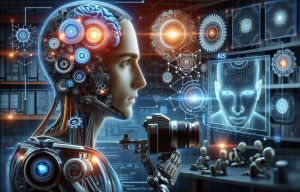Everything you need to know about artificial intelligence (AI)
Artificial intelligence raises many important questions regarding ethics, security, privacy and the future of work. This redefines the limits of what machines can do as well as the role they play in our society. As artificial intelligence continues to advance, it promises to bring more and more profound changes to better understand its essence, its use and its principles in the face of state regulations.
1. Presentation and definition
First of all, artificial intelligence (AI) is a branch of computer science aimed at creating systems capable of carrying out tasks that would normally require human intelligence. These include visual perception, speech recognition, decision-making and translation.
Then, AI encompasses various fields like mathematics, cognitive science, computational neurobiology and mathematical logic. All its strength is justified by these different areas which represent essential points of our society.
Finally, we must get closer to the history of artificial intelligence to better understand its mode of operation, which continues to improve year after year.
2. History of artificial intelligence (AI)
Artificial intelligence (AI) began as a field of experimentation in the 1950s. Since then, it has evolved to include various theories, algorithms and technologies, leading to the advanced systems we see today.
It is also important to emphasize that artificial intelligence really took off after the Second World War, just through the Dartmouth conference in 1956 which established AI as a research discipline.
Since then, AI has continued to improve to the point of having a capital importance in our society today. We wonder why artificial intelligence is so important.
3. Why is artificial intelligence important?
It is essential to recognize that humans can do everything that artificial intelligence does. The problem that arises most of the time is lack of time or the inability to process multiple data at once.
Artificial intelligence is important because it can quickly process large amounts of data, improve process efficiency, and enable discoveries and innovations that would otherwise be impossible. AI has become crucial in many fields, transforming entire industries with its potential to analyze data, learn from experience, and make intelligent decisions.
Indeed, the real question to ask should be: how to use AI to be more effective? Light will be shed on this question later.
4. How is artificial intelligence used?
AI is used in many fields such as health, education, finance, transportation to automate tasks, provide analytical insights, and improve services. It plays an important role in big data processing.
Additionally, AI works through a constellation of technologies that enable machines to perceive, understand, act and learn at levels of intelligence comparable to humans. It requires a large amount of data and special algorithms to be efficient.
However, we must always ask ourselves questions about the regulations around it, as in any scientific field. This is the essence of the remarks to come.
5. What are the copyright rules regarding artificial intelligence art?
Copyright rules regarding AI-generated art vary by jurisdiction, but there is debate over whether AI can be considered an author. Copyright for AI-generated art is a complex topic. In France, for example, a work must be imbued with the personality of its author to be protected, which is not the case for creations resulting from the latter.
It is therefore a question of a subject which always gives rise to reflection depending on the different localities in which we find ourselves. However, the best option remains to approach your government’s regulations.
In august 2023, a US judge: Art created solely by artificial intelligence cannot be copyrighted
“US copyright law protects only works of human creation,” judge writes.
6. Can AI art be copyrighted?
In some jurisdictions, AI-created art may be protected by copyright if a human contributed significantly to the creation of the work. The answer to this question is a little closer to the previous question regarding copyright as it relates to AI-generated art.
7. And what’s the deal with AI art generators and copyright infringement?
In reality, the problem is that AI art generators can use copyrighted works to create new works, raising questions about infringing on existing copyrights.
8. Predictions for the future of AI Art Copyright
It is likely that copyright laws will evolve to better regulate AI-generated art, with clarifications on intellectual property and copyright. This is with the aim of giving greater value to copyright.
9. Should AI-generated art be considered real art?
This is a very interesting and quite debated question in the world of art and technology. AI-generated art is often considered a form of digital art and is recognized for its ability to create unique and complex works. However, some art purists might argue that since it is not created by human hands, it should not be considered “real” art.
Ultimately, the definition of what constitutes “real” art is subjective and varies depending on cultural and individual perspectives. AI-generated art can be seen as an extension of human creativity, where the artist uses technology as a tool to express a vision or idea. Others may see it as a separate entity that deserves its own category in the art world.
10. US and European regulations and decisions on artificial intelligence
The United States and the European Union are working on regulations to govern the use of AI, with an emphasis on data protection, transparency, and ethics in the development and application of AI. ‘AI. Such regulations will be welcome in order to clarify all questions around copyright when it comes to artificial intelligence.

